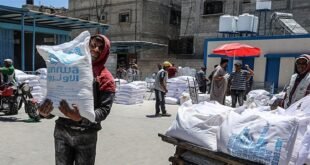22-02-2023
HARARE/ BEATRICE: For most of the last nine years, Admire Munatsi has gotten to his boss’s farmhouse in Beatrice, 65km (40 miles) south of Harare, at dawn, to begin a range of tasks from cleaning the chicken run and pigsty to washing cars. By 7am, he joins his workmates in his oversized work suit and tattered gumboots to start a 10-hour shift as an irrigator at the farm.
 His combined monthly pay for both roles is $70 but despite the poor wages and long working schedule, Munatsi considers himself lucky compared with many others across Zimbabwe who work similar daily routines.
His combined monthly pay for both roles is $70 but despite the poor wages and long working schedule, Munatsi considers himself lucky compared with many others across Zimbabwe who work similar daily routines.
“Sometimes my boss’s family pampers me with all their unwanted stuff-clothes, utensils, and even food,” Munatsi told media and “few farmers in the surrounding farms pay above $50.”
Zimbabwe’s agriculture sector remains the largest employer of labor in the country but the official minimum wage for farm laborers is about 78,000 Zimbabwean dollars (approximately $70) per month. With the annual inflation rate now at about 180 percent in a country where more than half of the workforce is in the informal sector, low-paying, labor-intensive jobs are still very appealing.
Across Zimbabwe, some farm laborers now work multiple jobs to complement their meagre earnings. Others are trying their luck in neighboring Botswana and South Africa, sometimes ending up as victims of horrific xenophobic attacks.
 Within Zimbabwe, many farm laborers live in colonial-era shacks commonly known as “makomboni”.
Within Zimbabwe, many farm laborers live in colonial-era shacks commonly known as “makomboni”.
Munatsi lives in one, sharing two rooms with his wife and four children. Some of his peers have to make do with living in renovated pigsties, tobacco barns, and horse stables on farms where they work.
Reporter spoke to almost a dozen laborers but most chose to speak anonymously for fear of reprisals from their bosses.
Like Munatsi, many said they struggle to provide even the basics for their family, routinely owing their bosses and money lenders, a pattern that has led to many farm laborers being forced to stick to their underpaying jobs for many years. (Int’l Monitoring Desk)
 Pressmediaofindia
Pressmediaofindia




